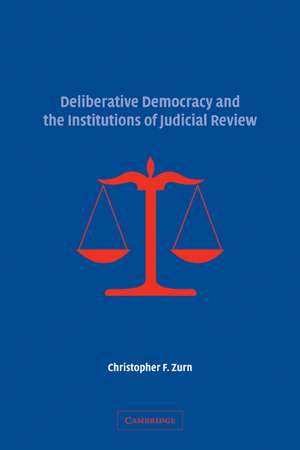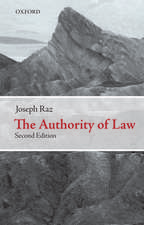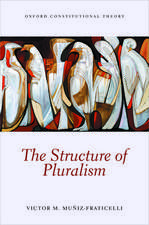Deliberative Democracy and the Institutions of Judicial Review
Autor Christopher F. Zurnen Limba Engleză Paperback – 16 sep 2009
| Toate formatele și edițiile | Preț | Express |
|---|---|---|
| Paperback (1) | 385.99 lei 6-8 săpt. | |
| Cambridge University Press – 16 sep 2009 | 385.99 lei 6-8 săpt. | |
| Hardback (1) | 755.87 lei 6-8 săpt. | |
| Cambridge University Press – 25 mar 2007 | 755.87 lei 6-8 săpt. |
Preț: 385.99 lei
Nou
Puncte Express: 579
Preț estimativ în valută:
73.87€ • 80.21$ • 62.05£
73.87€ • 80.21$ • 62.05£
Carte tipărită la comandă
Livrare economică 22 aprilie-06 mai
Preluare comenzi: 021 569.72.76
Specificații
ISBN-13: 9780521119801
ISBN-10: 0521119804
Pagini: 376
Dimensiuni: 152 x 229 x 21 mm
Greutate: 0.55 kg
Editura: Cambridge University Press
Colecția Cambridge University Press
Locul publicării:New York, United States
ISBN-10: 0521119804
Pagini: 376
Dimensiuni: 152 x 229 x 21 mm
Greutate: 0.55 kg
Editura: Cambridge University Press
Colecția Cambridge University Press
Locul publicării:New York, United States
Cuprins
Part I. Introduction: 1. An old chestnut is actually two; 2. Pathologies of ad hoc triangulation; 3. Functions and institutions; Part II. Majoritarian Democracy and Minoritarian Constitutionalism: 4. Judicial review as substantially legitimate protection of minority rights; 5. Judicial review as procedurally legitimate protection of democracy; 6. Moving beyond aggregative majoritarianism and minoritarian constitutionalism; Part III. From Majoritarian to Deliberative Theories of Constitutional Democracy: 7. Deliberative democracy: four axes of analysis; 8. Constitutionalism: four central elements; 9. Constitutional democracy?; Part IV. Deliberative Democracy and Substantive Constitutionalism: 10. Keepers of the substantive flame of American exceptionalism; 11. Guardians of the moral law in the forum of principle; 12. Are substantialist defenses of judicial review self-defeating?; Part V. Disagreement and the Constitution of Democracy: 13. Democratic precommitment to judicial review: Freeman; 14. Deliberative majoritarianism and the paternalism of judicial review: Waldron; 15. Upshot: we need a theory of democratic constitutionalism; Part VI. The Seducements of Juristic Discourse as Democratic Deliberation: 16. A division of labor between juristic deliberation and populist aggregation?; 17. Actual juristic discourse in the United States system of constitutional adjudication; 18. Legal principles and moral-political reasoning; Part VII. Constitutionalism as the Procedural Structuring of Deliberative Democracy: 19. A provisional summary: criteria for an adequate theory of constitutional review; 20. Guardians of the conditions of procedural legitimacy: Habermas; Part VIII. The Institutions of Constitutional Review I: Design Problems and Judicial Review: 21. The problems of designing institutions of constitutional review; 22. Independent constitutional courts in a concentrated review system; Part IX. The Institutions of Constitutional Review II: Horizontal Dispersal and Vertical Empowerment: 23. Self-review panels in the legislature and regulatory agencies; 24. Mechanisms for inter-branch debate and decisional dispersal; 25. Easing formal amendability requirements; 26. Establishing civic constitutional fora.
Recenzii
Review of the hardback: 'The book, in short, has several merits. The main one, probably, is to refine the old discussion of judicial review in the light of an open institutional scenario, without assuming a readymade parochial design imposed by history and without ignoring the increasing empirical and comparative data about institutional performance produced in the last decades.' Cambridge Law Journal
Descriere
Zurn examines the legitimacy of constitutional review using a normative theory of deliberative democratic constitutionalism.


















